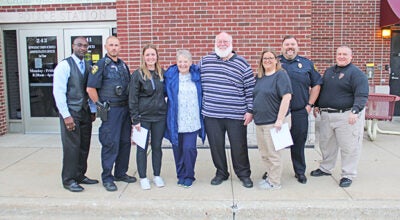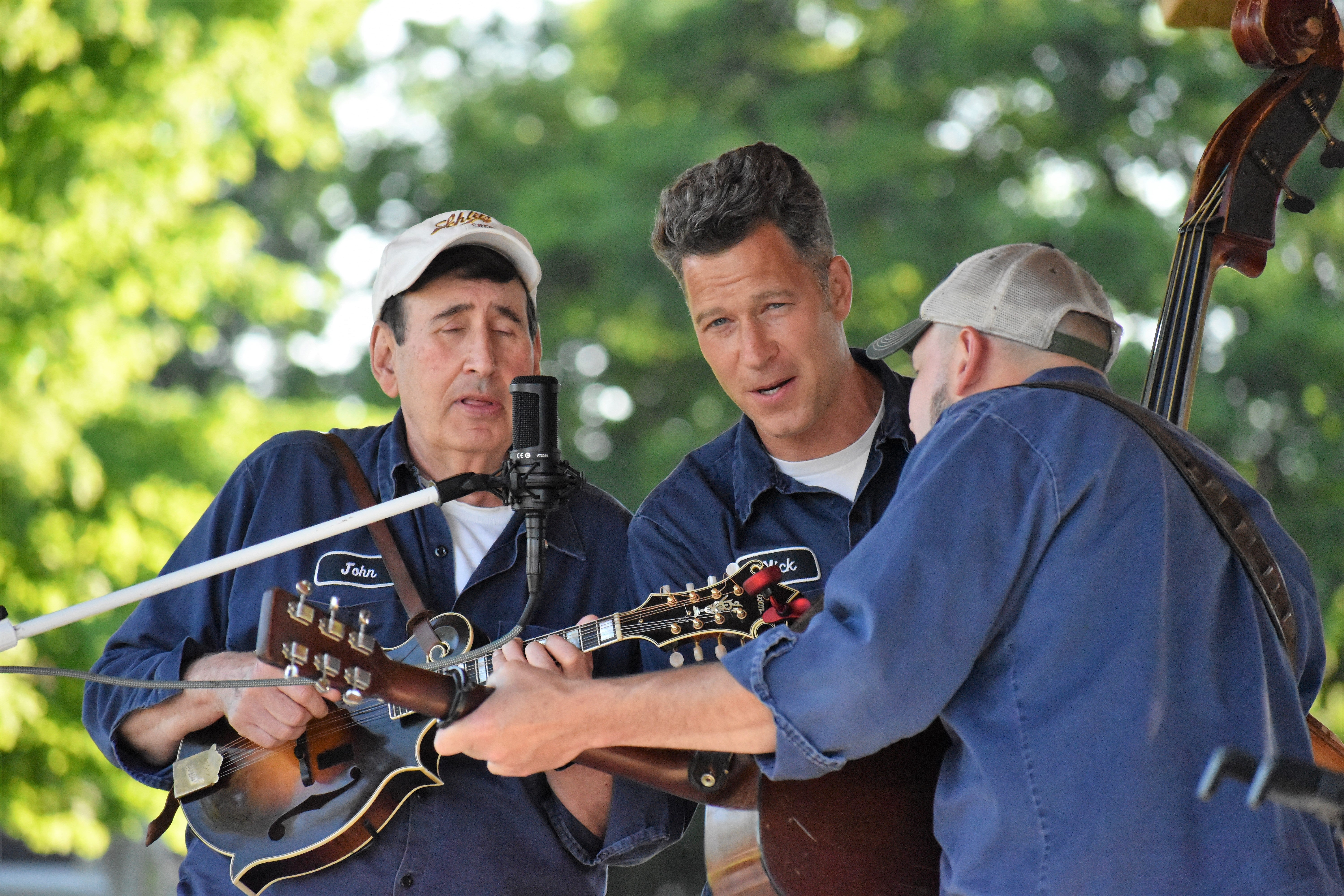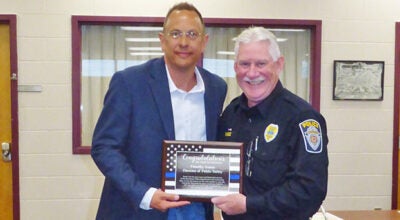Eliason trial: closing arguments to be heard Thursday
Published 11:22 pm Wednesday, August 18, 2010
By JESSICA SIEFF
Niles Daily Star
The people rested their case against 14-year-old Dakotah Eliason in day two of trial proceedings, presenting the jury with testimony from emergency responders who were first to arrive at the Niles Township home of Jesse and Jean Miles in the early hours of March 7 as well as expert witnesses.

Dakotah Eliason is shown with defense attorney Lanny Fisher on day two of the trial presented against him in the murder of his grandfather, Jesse Miles. Eliason could face life in prison without the possibility of parole.
Purposeful movement
First to take the stand Wednesday morning was Richard Hotary, an emergency medical technician specialist with Southwest Michigan Community Ambulance Service (SMCAS).
Hotary told the jury about the condition of Jesse Miles upon his arrival to the Miles’ home.
Miles had been shot in the head at the alleged hand of Eliason, his grandson.
Hotary said Miles had a “large wound” at his head and testified there was “quite a bit of blood on the ground.”
Still, he said, Miles was alive and breathing after having sustained the wound.
Asked if Miles, 69, had been conscious, Hotary answered, “he had purposeful movement,” and said as he and his partner were working on stabilizing him, Miles reached up for his head.
After being stabilized at Lakeland Hospital in Niles, Hotary said Miles was taken to Memorial Hospital in South Bend, a level two trauma center in “very critical” condition.
Miles would later be pronounced dead at Memorial Hospital.
Next to take the stand was Michigan State Trooper Chris Shoemaker who told the jury that upon arriving to the scene shortly before SMCAS, he found Miles “bleeding heavily” and “unresponsive.”

The prosecution, led by Berrien County Chief Prosecutor Arthur Cotter presented photos to the jury taken from the inside of the Miles’ home. Those photos showed the position of the furniture in the living room after Miles had been transported to the hospital and the blood stained sofa where he had been shot.
‘Shocked, upset and in disbelief’
Jean Miles, Shoemaker said, had seemed “very shocked, upset and in disbelief.”
Berrien County Prosecutor Arthur Cotter presented the jury with more evidence collected at the scene on the morning of the shooting, including the .38 revolver Eliason allegedly used to shoot his grandfather and five live rounds found in the chamber of the gun at the home, on a dining room chair, with the hammer cocked back.
It was Officer Michael Troup with the Buchanan Police Department who retrieved the gun, the witness told the court Wednesday and he testified that with that particular firearm, it would have to have been manually pulled back as it was when he found it.

Steven Eliason was the final witness called for the defense in the case against his son, Dakotah. He testified that his son had experience several incidents of loss in a short amount of time prior to the shooting.
Defense attorney Lanny Fisher was able to find subtle discrepancies in the testimony of Shoemaker who had testified he had pulled the bullets from the gun before Troup took it into his possession.
“You’re 100 percent sure that you did (pull the bullets from the gun)?” he asked Troup.
As the officer confirmed, Fisher replied Shoemaker would have been “mistaken” in earlier testimony.
Expert witnesses
Dr. Joseph Prahlow, a forensic pathologist with the South Bend Medical Foundation was the first expert witness for the prosecution.
Prahlow conducted the autopsy on Miles and testified to the exact cause of death — a gunshot wound to the head, that traveled through Miles’ skull, the left frontal lobe of his brain and lodged itself into is chin.
“There was no exit wound,” Prahlow said. “Mr. Miles died from a gunshot wound to the head.”
The bullet, he said, would be considered “deformed” as it was damaged upon retrieval and he estimated the range from which the shot came, as distant — somewhere further than three feet away.
As the prosecution’s witnesses took the stand one by one, Eliason, for the most part, kept his gaze downward, every so often looking over to his family in the gallery.
Beth Clark, a firearms examiner for the state’s crime lab testified to the bullet’s relation to the .38 revolver recovered at the scene.
Echoed sentiments
For the second time on record, the prosecution played two recordings of Eliason – one in the police cruiser where he was held in custody as police and emergency personnel tended to the scene and the victim and the other an interview with Det. Sgt. Fabian Suarez with the Michigan State Police Department.

Michigan State Trooper Chris Shoemaker testified for the prosecution on Tuesday.
His words, repeated in court hearings and news reports, were fresh to the jury, whose gazes drifted from the television screens in front of them to the 14-year-old defendant who, at times, wiped tears from his eyes and rested his head on his arms.
“You know, I wish I could take it back,” Eliason is heard saying as he sat in Casto’s vehicle. “But now I understand the feeling people get when they do that; now I understand how it feels.”
Eliason told Suarez the though “never crossed his mind” to wake his grandmother and talk to her about what was going on in his mind.
But he did discuss considering other methods of killing his grandfather before settling on the revolver that had been hanging in the kitchen on the hat rack.
The defense presents and rests

The first witness for the defense, Niles High School Principal Jim Knoll testified that Eliason had been a student with “better than average” grades who did not get into trouble.
With just four witnesses called to the stand, defense attorney Lanny Fisher rested his case inside the trial courtroom of Judge Scott Schofield in the Berrien County South County courthouse Wednesday afternoon.
Following the prosecution’s presentation to the jury, Fisher called to the stand Niles High School principal Jim Knoll, family friend Renee Van Dibier and parents Mary Apfel and Steven Eliason.
Fisher has seemed to be focused on two key points in his case. First, that what happened in the early morning hours of March 7 was out of character for his client, depicting the 14-year-old as a good kid who most would say never showed any signs of trouble before everything changed inside his grandparent’s home.
And second, despite all testimony from the prosecution, despite forensics and examinations and Eliason’s own words in audio and video recording, Fisher hoped to show the jury that one essential piece of the story was missing: a reason why.
Knoll was first to the stand Wednesday afternoon.
Fisher asked Knoll about Eliason’s performance as a student during his freshman year.
‘Better than average’
“Better than average,” Knoll said of Eliason’s grades. “Probably not the top student but pretty good.”
Knoll estimated Eliason’s grade point average right around 3.0, considering he had made the honor roll.
Asked if he’d ever had any problems with Eliason in school, Knoll said there had been none.
Next on the stand was Renee Van Dieber, a family friend to Steven and his wife Lisa.
She testified she’d known Eliason for most of his life, approximately 10 years.
“You’ve watched him grow up?” Fisher asked.
“Yes,” she said. Dieber described the boy as “mild-mannered” and “kind” and said she had never had any problems with him in her experience either.
Cotter questioned whether the witness was familiar with the facts of the case, to which she answered, “kind of. Somewhat.”
‘A calm, loving child’
Apfel, Eliason’s biological mother was next to take the stand. During the prosecution’s presentation, the jury heard as Eliason had talked about his frustrations with both parents.
But against expectation, Fisher questioned both Apfel and Eliason pointedly and did not go into great detail regarding his client’s childhood or the details of his relationship to his parents.
Apfel testified she and Steven had split up when her son was just 18 months old. They had never married and she described their relationship as “an off and on rocky relationship.”
She also testified that prior to her son’s arrest for the alleged shooting of his grandfather, Jesse Miles, he had expressed both pride and frustration with his father, Steven.
“He did express to me that he was upset with his father,” Apfel said, adding that he felt nothing he did was good enough. But Eliason was apparently also “very proud” of his dad for going to college.
Fisher questioned Apfel about Eliason’s relationship with his little brother, Bradley, who he mentioned during a taped interview played previously for the jury.
In that interview, Eliason said the “pent up emotions” he had been feeling were due to various reasons including the fact that he felt he could not see his brother enough and that he was going to grow up without him.
Apfel said she would “try to schedule (visits with Dakotah) at the same time” she had visitation with her younger son.
Eliason’s mother also testified that she was aware her son had lost a “very good friend,” who had committed suicide not long before the shooting.
Asked to describe her son, Apfel said Eliason was a ”calm, loving child.”
Cotter made his cross examination of Eliason’s mother quickly, asking to her what he might have meant when he could have been frustrated with her for.
“Maybe not being there full-time,” she said.
But he quickly brought the focus back to the relationship between Eliason and his grandparents, Jesse and Jean Miles.
“Did Dakotah every say to you ever that his grandmother Jean Miles or his grandfather Jesse Miles ever did anything bad to him?” Cotter asked.
“No,” Apfel said.
“Did you know how he felt about his grandparents,” he said.
“He loved them very much,” Apfel said.
A share of mistakes

Eliason’s mother, Mary Apfel, took the stand for the defense and described her son as “calm,” “peaceful" and "loving.”
For his last witness, Fisher called up Eliason’s father Steven.
As his son looked on, Steven testified he had had custody of Eliason since he was 18 months old and admitted that in regard to the “pent up emotion” his son had claimed to members of law enforcement on the morning of his arrest — the morning Steven’s father was killed by a single gunshot wound to the head — “there’s been off and on episodes.”
Steven told the jury his son had lost a cousin, a beloved family pet, a family friend and a close friend from school all in a relatively short amount of time and that he and his wife asked his son if he needed to speak to a counselor.
“We asked if he was okay,” Steven said. “We encouraged him if he needed someone to talk to,” to let them know.
“He has always been peaceful and loving and caring up until that night,” he said.
Upon cross examination, Steven admitted that his son might have needed counseling when Cotter asked him why he never took the initiative to get his son some help if he felt he needed it.
“No,” he said. “I made the mistake of not doing that, sir.”
Both sides will present their closing arguments to the jury Thursday morning, after which those jurors will decide the fate of the 14-year-old boy at the center of a story that has torn apart two families and left a beloved brother, father, grandfather and friend dead.






